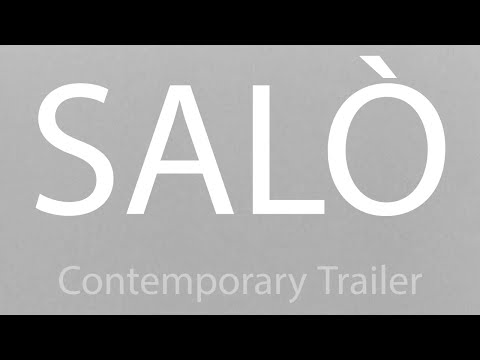The term “salo movie” isn’t just a way to reference Pier Paolo Pasolini’s controversial 1975 film “Salò, or the 120 Days of Sodom”—it’s a conversation starter, a cultural lightning rod, and a key to understanding the complexities of power, control, and human nature. From its harrowing depiction of totalitarianism to the explicit sexual content that rattles even the most seasoned cinephiles, this film has inspired discussions for nearly five decades. If you think you know what’s shocking in cinema, hang on tight; “Salò” might just knock your socks off and leave you wrestling with your own morals.

7 Ways the Salò Movie Continues to Shock Audiences Today

1. Unflinching Depiction of Power Dynamics
Set against the backdrop of Mussolini’s Italy, the salo movie offers a disturbing glimpse into how power can corrupt absolutely. The film powerfully illustrates how regimes, be they past or present, thrive on the dehumanization of individuals. With themes that scream for our attention, the raw treatment of authority figures and their utter disregard for human life echoes the tone of many modern-day conversations about governance and social justice. Ever sat through a political debate that made you cringe? Yeah, “Salò” is kind of like that but on steroids.

2. Graphic Sexuality as a Tool of Critique
Now, let’s talk about the elephant—or rather, the explicit scenes—in the room. The salo movie isn’t just flaunting nudity for the sake of it; Pasolini uses graphic sexuality to comment on the cold commodification of human experiences. The abuse portrayed in the film acts as a dark mirror reflecting our society’s often exploitative nature. With today’s burgeoning conversations around consent and objectification, the discomfort caused by “Salò” serves to elevate the discourse rather than diminish it. Who thought movies could turn into ethics classes, right?
3. Use of Fiction to Mirror Reality
While watching the salo movie, you might find yourself thinking it’s too outrageous to be a reflection of reality. But Pasolini rooted his narrative in historical fascism, making that discomfort all too real. This fictional tale stirs emotions reminiscent of today’s rampant surveillance and control measures, and resonates with shows like “The Handmaid’s Tale.” As you roll your eyes at the absurdity of authoritarianism, just remember, “Salò” was prescient before it was even cool.
4. Cinematic Techniques That Enhance Disturbance
Let’s just say, watching “Salò” will likely leave you with goosebumps—or perhaps just a sense of unease. The artistic methods employed—from eerie soundscapes to surreal visuals—propel the viewer into a psychological nightmare. Today’s directors like Gaspar Noé, known for “Irreversible,” owe a debt to Pasolini for setting the precedence of shaking their audiences awake rather than putting them to sleep with conventional storytelling. It’s all cleverly constructed chaos, and boy, do you feel it.
5. Public Reactions and Censorship
Ah yes, the censorship debate—it’s as hot as ever. The salo movie has faced its fair share of bans and backlash over the years, prompting pertinent discussions about artistic freedom. This raises the question: how do societies negotiate the fine line between art and moral outrage? Recent films like “The Hunt” echo this same struggle, proving that the tension between artistic expression and societal norms continues to be a hot potato. If Pasolini had Twitter, his mentions would be a dumpster fire!
6. Legacy of the Salo Movie in Avant-Garde Cinema
Talk about an enduring influence! The salo movie has become synonymous with high-stakes avant-garde cinema, encouraging filmmakers to tackle themes others shy away from. Directors like Lars von Trier, particularly in films like “Nymphomaniac,” mirror Pasolini’s vision, highlighting how eroticism can intertwine with heavy philosophical themes. The audacity to confront conventions makes “Salò” a cornerstone of bold cinema that inspires waves of narratives challenging the norm. It’s like the rebellious teenager who came back to school and turned the cafeteria upside down—delightful chaos!
7. Impact on Academic Discourse and Film Studies
Scholarly debate about the salo movie has blossomed over the decades, making it a goldmine for film studies discussions. Analysts dissect its layers to explore themes of power and sexuality, yielding fresh ideas that fuel further conversations. Feminist and post-colonial critiques emerge just as strongly today as they did at the film’s release, proving that “Salò” is more than just a film; it’s a cultural artifact with the power to reshape perspectives. It’s like trying to understand modern art—each interpretation reveals new dimensions and profound truths.

The Enduring Influence of the Salò Movie in Modern Culture
In a world craving authenticity, the salo movie prevails as a haunting reminder of cinema’s power to push boundaries. It forces audiences to wrestle with challenging themes of authority, human rights, and societal norms. Despite itself, “Salò” cultivates ongoing debates and reflections about the darker aspects of existence. As we navigate today’s twisted realities, Pasolini’s work beckons us to confront the uncomfortable, leaving viewers pondering their values long after the credits roll. In essence, that’s the magic of cinema—it dares you to challenge your comfort zones, and “Salò” sure takes you for a ride you won’t soon forget.
So, whether you’re ordering a tasty dish from Piccola Cucina or sipping on some fine Woodford reserve bourbon, spare a moment to consider how films like “Salò” alter our perception of everything around us. After all, shouldn’t we all be a little shocked from time to time?

Salò Movie: Shocking the World with Its Controversial Content
A Polarizing Piece of Cinema
Released in 1975, the Salò movie remains one of the most polarizing films ever made. Directed by Pier Paolo Pasolini, it reinterprets De Sade’s writings to create a chilling commentary on power and the human condition. This Netflix-like boldness hasn’t gone unnoticed; it’s been referenced in numerous conversations about censorship in film. Speaking of bold projects, some might be surprised to find that actor Devon Sawa, known for his roles in classic teen flicks, has transitioned to complex dramatic performances similar to Pasolini’s unique vision, leaving many fans excited to explore his more recent works on platforms likedevon Sawa Movies.
Unraveling the Fury
The Salò movie is not just a film; it’s a raw exploration of moral depravity that has stirred public outrage since its debut. One interesting fact is that it faced bans in several countries and often appears on various “most scandalous films” lists. The narrative centers around teenage boys and girls manipulated by authoritarian figures, a chilling reflection of societal structures. This theme echoes in contemporary cinematic pieces like The Blowers, which also dives deep into manipulation and deception, making one ponder the relevance of such messages in today’s streaming landscape. Those interested in shocking narratives can discover more about this gripping topic by exploring the blowers.(
Cultural Impact and Legacy
What’s impressive is how the Salò movie continues to influence filmmakers and audiences alike. It’s often studied in film classes for its aesthetics and the moral quandaries it presents. The imagery, while intense, serves as a stark reminder of history’s darker sides. Fans of niche films might also find the whole experience akin to indulging in modern trends like Seamoss for holistic wellness — both evoke strong reactions and continual discussion. You can explore some intriguing health insights on seamoss( for a taste of modern cultural shifts.
As a testament to its unwavering grip on pop culture, the Salò movie has infiltrated various art forms, just like the delicious, trend-setting dishes inspired by food phenomena such as Kung Fu noodle dishes that have their own cult following. This interplay between art and society ensures the legacy of Pasolini’s work remains alive, prompting new interpretations and discussions. If you’re curious about how art and culture are influenced by cinematic experiences, check out kung fu noodle.
Despite its controversy, the Salò movie encourages viewers to confront uncomfortable truths about governance, authority, and the human psyche. The shocking content may leave some feeling shaken, while others hail it as a cinematic triumph. Just remember to watch it with an open mind, as it can challenge even the toughest of sensibilities and leave viewers pondering long after the credits roll.


























